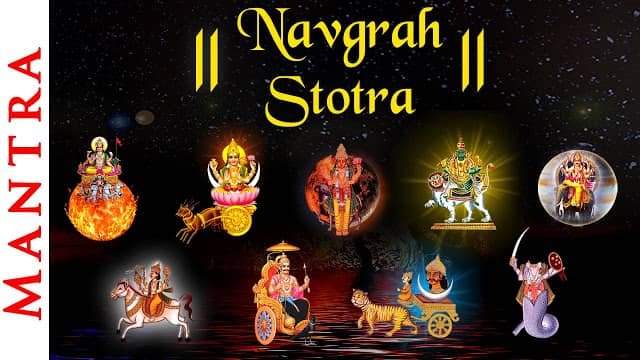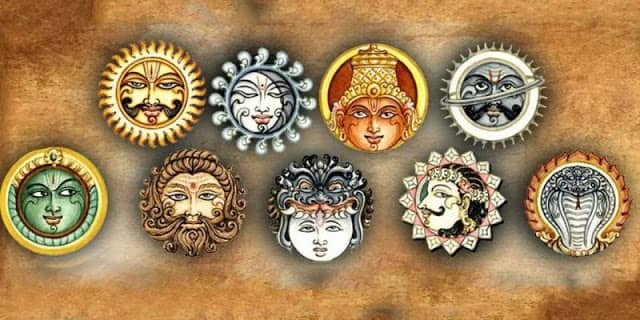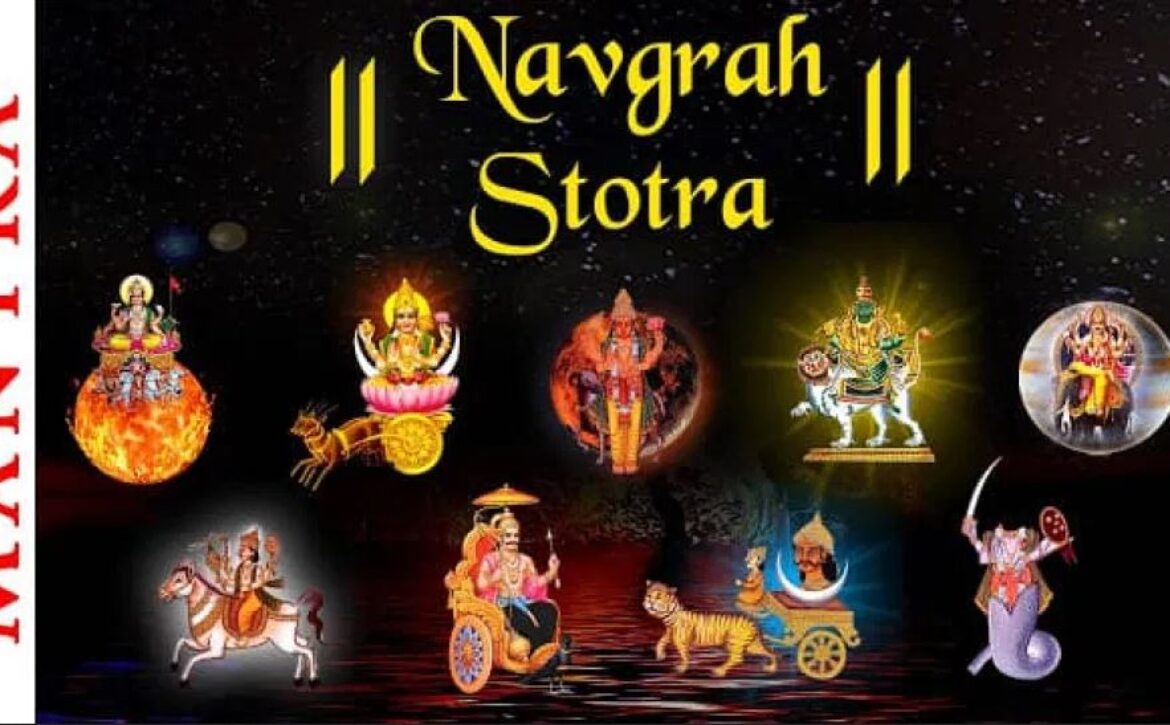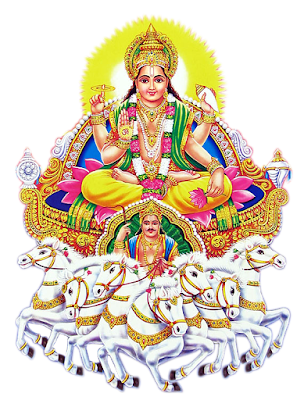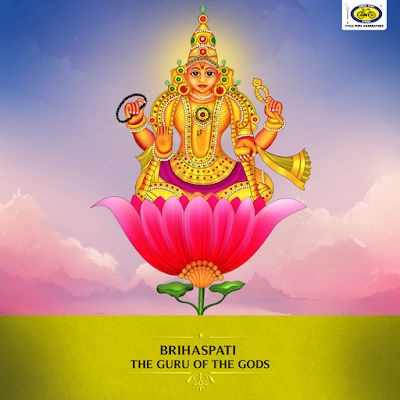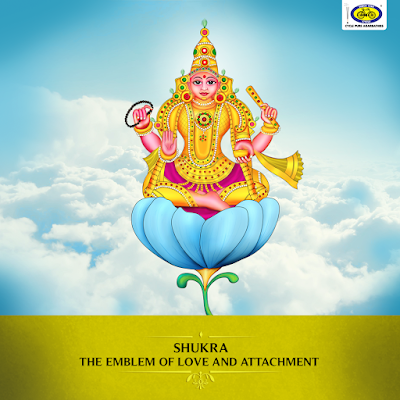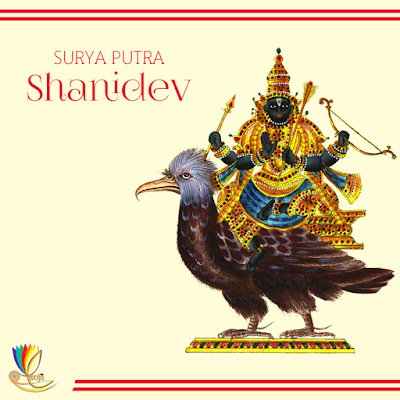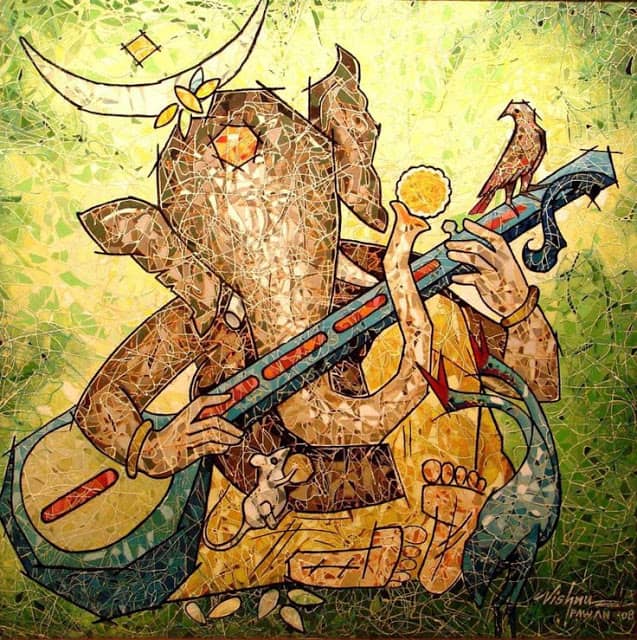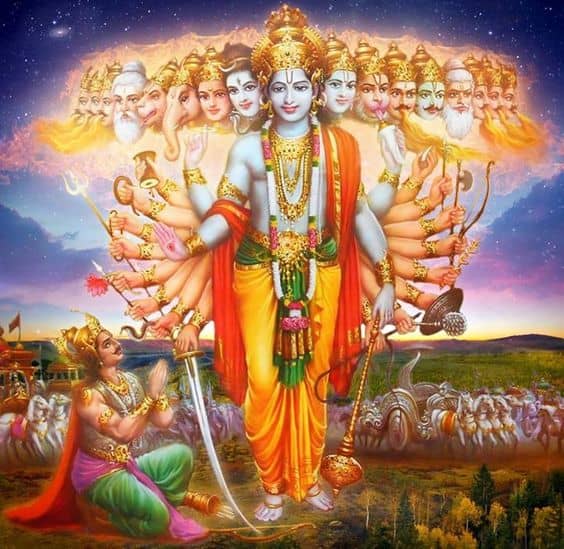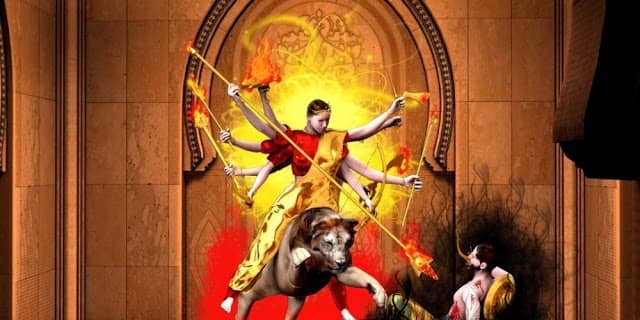English Translation with Purport on Narayana Kavach by Srila Prabhupad
The Narayana Kavach Begins:

After explaining this process, Śukadeva Gosvāmī told MahārājaParīkṣit how Viśvarūpa, the brother of Vṛtrāsura, described the glories of the Nārāyaṇa-kavaca to Indra.
TEXTS 1–2
śrī-rājovāca
yayā guptaḥ sahasrākṣaḥ
savāhān ripu-sainikān
krīḍann iva vinirjitya
tri-lokyā bubhuje śriyam
bhagavaṁs tan mamākhyāhi
varma nārāyaṇātmakam
yathātatāyinaḥ śatrūn
yena gupto ’jayan mṛdhe
TRANSLATION
King Parīkṣit inquired from Śukadeva Gosvāmī: My lord, kindly explain the Viṣṇu mantra armor that protected King Indra and enabled him to conquer his enemies, along with their carriers, and enjoy the opulence of the three worlds. Please explain to me that Nārāyaṇa armor, by which King Indra achieved success in battle, conquering the enemies who were endeavoring to kill him.
TEXT 3
śrī-bādarāyaṇir uvāca
vṛtaḥ purohitas tvāṣṭro
mahendrāyānupṛcchate
nārāyaṇākhyaṁ varmāha
tad ihaika-manāḥ śṛṇu
TRANSLATION
Śrī Śukadeva Gosvāmī said: King Indra, the leader of the demigods, inquired about the armor known as Nārāyaṇa-kavaca from Viśvarūpa, who was engaged by the demigods as their priest. Please hear Viśvarūpa’s reply with great attention.
TEXTS 4–6
śrī-viśvarūpa uvāca
dhautāṅghri-pāṇir ācamya
sapavitra udaṅ-mukhaḥ
kṛta-svāṅga-kara-nyāso
mantrābhyāṁ vāg-yataḥ śuciḥ
nārāyaṇa-paraṁ varma
sannahyed bhaya āgate
pādayor jānunor ūrvor
udare hṛdy athorasi
mukhe śirasy ānupūrvyād
oṁkārādīni vinyaset
oṁ namo nārāyaṇāyeti
viparyayam athāpi vā
TRANSLATION
Viśvarūpa said: If some form of fear arrives, one should first wash his hands and legs clean and then perform ācamana by chanting this mantra: oṁ apavitraḥ pavitro vā sarvāvasthāṁ gato ’pi vā/ yaḥ smaret puṇḍarīkākṣaṁ sa bahyābhyantaraḥ śuciḥ/ śrī-viṣṇu śrī-viṣṇu śrī-viṣṇu. Then one should touch kuśa grass and sit gravely and silently, facing north. When completely purified, one should touch the mantra composed of eight syllables to the eight parts of his body and touch the mantra composed of twelve syllables to his hands. Thus, in the following manner, he should bind himself with the Nārāyaṇa coat of armor. First, while chanting the mantra composed of eight syllables [oṁ namonārāyaṇāya], beginning with the praṇava, the syllable oṁ, one should touch his hands to eight parts of his body, starting with the two feet and progressing systematically to the knees, thighs, abdomen, heart, chest, mouth and head. Then one should chant the mantra in reverse, beginning from the last syllable [ya], while touching the parts of his body in the reverse order. These two processes are known as utpatti-nyāsa and saṁhāra-nyāsa respectively.
TEXT 7
kara-nyāsaṁ tataḥ kuryād
dvādaśākṣara-vidyayā
praṇavādi-ya-kārāntam
aṅguly-aṅguṣṭha-parvasu
TRANSLATION
Then one should chant the mantra composed of twelve syllables [oṁ namo bhagavate vāsudevāya]. Preceding each syllable by the oṁkāra, one should place the syllables of the mantra on the tips of his fingers, beginning with the index finger of the right hand and concluding with the index finger of the left. The four remaining syllables should be placed on the joints of the thumbs.
TEXTS 8–10
nyased dhṛdaya oṁkāraṁ
vi-kāram anu mūrdhani
ṣa-kāraṁ tu bhruvor madhye
ṇa-kāraṁ śikhayā nyaset
ve-kāraṁ netrayor yuñjyān
na-kāraṁ sarva-sandhiṣu
ma-kāram astram uddiśya
mantra-mūrtir bhaved budhaḥ
savisargaṁ phaḍ-antaṁ tat
sarva-dikṣu vinirdiśet
oṁ viṣṇave nama iti
TRANSLATION
One must then chant the mantra of six syllables [oṁviṣṇave namaḥ]. One should place the syllable “oṁ” on his heart, the syllable “vi” on the top of his head, the syllable “ṣa” between his eyebrows, the syllable “ṇa” on his tuft of hair [śikhā], and the syllable “ve” between his eyes. The chanter of the mantra should then place the syllable “na” on all the joints of his body and meditate on the syllable “ma” as being a weapon. He should thus become the perfect personification of the mantra. Thereafter, adding visarga to the final syllable “ma,” he should chant the mantra “maḥ astrāya phaṭ” in all directions, beginning from the east. In this way, all directions will be bound by the protective armor of the mantra.
TEXT 11
ātmānaṁ paramaṁ dhyāyed
dhyeyaṁ ṣaṭ-śaktibhir yutam
vidyā-tejas-tapo-mūrtim
imaṁ mantram udāharet
TRANSLATION
After finishing this chanting, one should think himself qualitatively one with the Supreme Personality of Godhead, who is full in six opulences and is worthy to be meditated upon. Then one should chant the following protective prayer to Lord Nārāyaṇa, the Nārāyaṇa-kavaca.
TEXT 12
oṁ harir vidadhyān mama sarva-rakṣāṁ
nyastāṅghri-padmaḥ patagendra-pṛṣṭhe
darāri-carmāsi-gadeṣu-cāpa-
pāśān dadhāno ’ṣṭa-guṇo ’ṣṭa-bāhuḥ
TRANSLATION
The Supreme Lord, who sits on the back of the bird Garuḍa, touching him with His lotus feet, holds eight weapons—the conchshell, disc, shield, sword, club, arrows, bow and ropes. May that Supreme Personality of Godhead protect me at all times with His eight arms. He is all-powerful because He fully possesses the eight mystic powers [aṇimā, laghimā, etc.].
PURPORT
Thinking oneself one with the Supreme is called ahaṅgrahopāsanā. Through ahaṅgrahopāsanā one does not become God, but he thinks of himself as qualitatively one with the Supreme. Understanding that as a spirit soul he is equal in quality to the supreme soul the way the water of a river is of the same nature as the water of the sea, one should meditate upon the Supreme Lord, as described in this verse, and seek His protection. The living entities are always subordinate to the Supreme. Consequently their duty is to always seek the mercy of the Lord in order to be protected by Him in all circumstances.
TEXT 13
jaleṣu māṁ rakṣatu matsya-mūrtir
yādo-gaṇebhyo varuṇasya pāśāt
sthaleṣu māyāvaṭu-vāmano ’vyāt
trivikramaḥ khe ’vatu viśvarūpaḥ
TRANSLATION
May the Lord, who assumes the body of a great fish, protect me in the water from the fierce animals that are associates of the demigod Varuṇa. By expanding His illusory energy, the Lord assumed the form of the dwarf Vāmana. May Vāmana protect me on the land. Since the gigantic form of the Lord, Viśvarūpa, conquers the three worlds, may He protect me in the sky.
PURPORT
This mantra seeks the protection of the Supreme Personality of Godhead in the water, land and sky in His incarnations as the fish, Vāmanadeva and the Viśvarūpa.
TEXT 14
durgeṣv aṭavy-āji-mukhādiṣu prabhuḥ
pāyān nṛsiṁho ’sura-yūthapāriḥ
vimuñcato yasya mahāṭṭa-hāsaṁ
diśo vinedur nyapataṁś ca garbhāḥ
TRANSLATION
May Lord Nṛsiṁhadeva, who appeared as the enemy of Hiraṇyakaśipu, protect me in all directions. His loud laughing vibrated in all directions and caused the pregnant wives of the asuras to have miscarriages. May that Lord be kind enough to protect me in difficult places like the forest and battlefront.
TEXT 15
rakṣatv asau mādhvani yajña-kalpaḥ
sva-daṁṣṭrayonnīta-dharo varāhaḥ
rāmo ’dri-kūṭeṣv atha vipravāse
salakṣmaṇo ’vyād bharatāgrajo ’smān
TRANSLATION
The Supreme indestructible Lord is ascertained through the performance of ritualistic sacrifices and is therefore known as Yajñeśvara. In His incarnation as Lord Boar, He raised the planet earth from the water at the bottom of the universe and kept it on His pointed tusks. May that Lord protect me from rogues on the street. May Paraśurāma protect me on the tops of mountains, and may the elder brother of Bharata, Lord Rāmacandra, along with His brother Lakṣmaṇa, protect me in foreign countries.
PURPORT
There are three Rāmas. One Rāma is Paraśurāma (Jāmadāgnya). another Rāma is Lord Rāmacandra, and a third Rāma is Lord Balarāma. In this verse the words rāmo’dri-kūṭeṣv atha indicate Lord Paraśurāma. The brother of Bharata Mahārāja and Lakṣmaṇa is Lord Rāmacandra.
TEXT 16
mām ugra-dharmād akhilāt pramādān
nārāyaṇaḥ pātu naraś ca hāsāt
dattas tv ayogād atha yoga-nāthaḥ
pāyād guṇeśaḥ kapilaḥ karma-bandhāt
TRANSLATION
May Lord Nārāyaṇa protect me from unnecessarily following false religious systems and falling from my duties due to madness. May the Lord in His appearance as Nara protect me from unnecessary pride. May Lord Dattātreya, the master of all mystic power, protect me from falling while performing bhakti-yoga, and may Lord Kapila, the master of all good qualities, protect me from the material bondage of fruitive activities.
TEXT 17
sanat-kumāro ’vatu kāmadevād
dhayaśīrṣā māṁ pathi deva-helanāt
devarṣi-varyaḥ puruṣārcanāntarāt
kūrmo harir māṁ nirayād aśeṣāt
TRANSLATION
May Sanat-kumāra protect me from lusty desires. As I begin some auspicious activity, may Lord Hayagrīva protect me from being an offender by neglecting to offer respectful obeisances to the Supreme Lord. May DevarṣiNārada protect me from committing offenses in worshiping the Deity, and may Lord Kūrma, the tortoise, protect me from falling to the unlimited hellish planets.
PURPORT
Lusty desires are very strong in everyone, and they are the greatest impediment to the discharge of devotional service. Therefore those who are very much influenced by lusty desires are advised to take shelter of Sanat-kumāra, the great brahmacārī devotee.
Nārada Muni, who is the guide for arcana, is the author of the Nārada-pañcarātra, which prescribes the regulative principles for worshiping the Deity. Everyone engaged in Deity worship, whether at home or in the temple, should always seek the mercy of Devarṣi Nārada in order to avoid the thirty-two offenses while worshiping the Deity. These offenses in Deity worship are mentioned in The Nectar of Devotion.
TEXT 18
dhanvantarir bhagavān pātv apathyād
dvandvād bhayād ṛṣabho nirjitātmā
yajñaś ca lokād avatāj janāntād
balo gaṇāt krodha-vaśād ahīndraḥ
TRANSLATION
May the Supreme Personality of Godhead in His incarnation as Dhanvantari relieve me from undesirable eatables and protect me from physical illness. May Lord Ṛṣabhadeva, who conquered His inner and outer senses, protect me from fear produced by the duality of heat and cold. May Yajña protect me from defamation and harm from the populace, and may Lord Balarāma as Śeṣa protect me from envious serpents.
PURPORT
To live within this material world, one must face many dangers, as described herein. For example, undesirable food poses a danger to health, and therefore one must give up such food. The Dhanvantari incarnation can protect us in this regard. Since Lord Viṣṇu is the Supersoul of all living entities, if He likes He can save us from adhibhautika disturbances, disturbances from other living entities. Lord Balarāma is the Śeṣa incarnation, and therefore He can save us from angry serpents or envious persons, who are always ready to attack.
TEXT 19
dvaipāyano bhagavān aprabodhād
buddhas tu pāṣaṇḍa-gaṇa-pramādāt
kalkiḥ kaleḥ kāla-malāt prapātu
dharmāvanāyoru-kṛtāvatāraḥ
TRANSLATION
May the Personality of Godhead in His incarnation as Vyāsadeva protect me from all kinds of ignorance resulting from the absence of Vedic knowledge. May Lord Buddhadeva protect me from activities opposed to Vedic principles and from laziness that causes one to madly forget the Vedic principles of knowledge and ritualistic action. May Kalkideva, the Supreme Personality of Godhead, who appeared as an incarnation to protect religious principles, protect me from the dirt of the age of Kali.
PURPORT
This verse mentions various incarnations of the Supreme Personality of Godhead who appear for various purposes. Śrīla Vyāsadeva, Mahāmuni, compiled the Vedic literature for the benefit of all human society. If one wants to be protected from the reactions of ignorance even in this age of Kali, one may consult the books left by Śrīla Vyāsadeva, Upaniṣads, Vedānta-sūtra (Brahma-sūtra), Mahābhārata, Śrīmad-Bhāgavatam Mahā-Purāṇa (Vyāsadeva’s commentary on the Brahma-sūtra) and the other seventeen Purāṇas. Only by the mercy of Śrīla Vyāsadeva do we have so many volumes of transcendental knowledge to save us from the clutches of ignorance.
As described by Śrīla Jayadeva Gosvāmī in his Daśāvatāra-stotra, Lord Buddha apparently decried the Vedic knowledge:
nindasi yajña-vidher ahaha śruti-jātaṁ
sadaya-hṛdaya-darśita-paśu-ghātam
keśava dhṛta-buddha-śarīra jaya jagad-īśa hare
The mission of Lord Buddha was to save people from the abominable activity of animal killing and to save the poor animals from being unnecessarily killed. When pāṣaṇḍīs were cheating by killing animals on the plea of sacrificing them in Vedic yajñas, the Lord said, “If the Vedic injunctions allow animal killing, I do not accept the Vedic principles.” Thus he actually saved people who acted according to Vedic principles. One should therefore surrender to Lord Buddha so that he can help one avoid misusing the injunctions of the Vedas.
The Kalki avatāra is the fierce incarnation who vanquishes the class of the atheists born in this age of Kali. Now, in the beginning of Kali-yuga, many irreligious principles are in effect, and as Kali-yuga advances, many pseudo religious principles will certainly be introduced, and people will forget the real religious principles enunciated by Lord Kṛṣṇa before the beginning of Kali-yuga, namely principles of surrender unto the lotus feet of the Lord. Unfortunately, because of Kali-yuga, foolish people do not surrender to the lotus feet of Kṛṣṇa. Even most people who claim to belong to the Vedic system of religion are actually opposed to the Vedic principles. Every day they manufacture a new type of dharma on the plea that whatever one manufactures is also a path of liberation. Atheistic men generally say, yata mata tata patha.
According to this view, there are hundreds and thousands of different opinions in human society, and each opinion is a valid religious principle. This philosophy of rascals has killed the religious principles mentioned in the Vedas, and such philosophies will become increasingly influential as Kali-yuga progresses. In the last stage of Kali-yuga, Kalkideva, the fierce incarnation of Keśava, will descend to kill all the atheists and will save only the devotees of the Lord.
TEXT 20
māṁ keśavo gadayā prātar avyād
govinda āsaṅgavam ātta-veṇuḥ
nārāyaṇaḥ prāhṇa udātta-śaktir
madhyan-dine viṣṇur arīndra-pāṇiḥ
TRANSLATION
May Lord Keśava protect me with His club in the first portion of the day, and may Govinda, who is always engaged in playing His flute, protect me in the second portion of the day. May Lord Nārāyaṇa, who is equipped with all potencies, protect me in the third part of the day, and may Lord Viṣṇu, who carries a disc to kill His enemies, protect me in the fourth part of the day.
PURPORT
According to Vedic astronomical calculations, day and night are each divided into thirty ghaṭikās (twenty-four minutes), instead of twelve hours. Generally, each day and each night is divided into six parts consisting of five ghaṭikās. In each of these six portions of the day and night, the Lord may be addressed for protection according to different names. Lord Keśava, the proprietor of the holy place of Mathurā, is the Lord of the first portion of the day, and Govinda, the Lord of Vṛndāvana. is the master of the second portion.
TEXT 21
devo ’parāhṇe madhu-hogradhanvā
sāyaṁ tri-dhāmāvatu mādhavo mām
doṣe hṛṣīkeśa utārdha-rātre
niśītha eko ’vatu padmanābhaḥ
TRANSLATION
May Lord Madhusūdana, who carries a bow very fearful for the demons, protect me during the fifth part of the day. In the evening, may Lord Mādhava, appearing as Brahmā, Viṣṇu and Maheśvara, protect me, and in the beginning of night may Lord Hṛṣīkeśa protect me. At the dead of night [in the second and third parts of night] may Lord Padmanābha alone protect me.
TEXT 22
śrīvatsa-dhāmāpara-rātra īśaḥ
pratyūṣa īśo ’si-dharo janārdanaḥ
dāmodaro ’vyād anusandhyaṁ prabhāte
viśveśvaro bhagavān kāla-mūrtiḥ
TRANSLATION
May the Supreme Personality of Godhead, who bears the Śrīvatsa on His chest, protect me after midnight until the sky becomes pinkish. May Lord Janārdana, who carries a sword in His hand, protect me at the end of night [during the last four ghaṭikās of night]. May Lord Dāmodara protect me in the early morning, and may Lord Viśveśvara protect me during the junctions of day and night.
TEXT 23
cakraṁ yugāntānala-tigma-nemi
bhramat samantād bhagavat-prayuktam
dandagdhi dandagdhy ari-sainyam āśu
kakṣaṁ yathā vāta-sakho hutāśaḥ
.
TRANSLATION
Set into motion by the Supreme Personality of Godhead and wandering in all the four directions, the disc of the Supreme Lord has sharp edges as destructive as the fire of devastation at the end of the millennium. As a blazing fire burns dry grass to ashes with the assistance of the breeze, may that Sudarśana cakra burn our enemies to ashes.
TEXT 24
gade ’śani-sparśana-visphuliṅge
niṣpiṇḍhi niṣpiṇḍhy ajita-priyāsi
kuṣmāṇḍa-vaināyaka-yakṣa-rakṣo-
bhūta-grahāṁś cūrṇaya cūrṇayārīn
TRANSLATION
O club in the hand of the Supreme Personality of Godhead, you produce sparks of fire as powerful as thunderbolts, and you are extremely dear to the Lord. I am also His servant. Therefore kindly help me pound to pieces the evil living beings known as Kuṣmāṇḍas, Vaināyakas, Yakṣas, Rākṣasas, Bhūtas and Grahas. Please pulverize them.
TEXT 25
tvaṁ yātudhāna-pramatha-preta-mātṛ–
piśāca-vipragraha-ghora-dṛṣṭīn
darendra vidrāvaya kṛṣṇa-pūrito
bhīma-svano ’rer hṛdayāni kampayan
TRANSLATION
O best of conchshells, O Pāñcajanya in the hands of the Lord, you are always filled with the breath of Lord Kṛṣṇa. Therefore you create a fearful sound vibration that causes trembling in the hearts of enemies like the Rākṣasas, pramatha ghosts, Pretas, Mātās, Piśācas and brāhmaṇa ghosts with fearful eyes.
TEXT 26
tvaṁ tigma-dhārāsi-varāri-sainyam
īśa-prayukto mama chindhi chindhi
cakṣūṁṣi carmañ chata-candra chādaya
dviṣām aghonāṁ hara pāpa-cakṣuṣām
TRANSLATION
O king of sharp-edged swords, you are engaged by the Supreme Personality of Godhead. Please cut the soldiers of my enemies to pieces. Please cut them to pieces! O shield marked with a hundred brilliant moonlike circles, please cover the eyes of the sinful enemies. Pluck out their sinful eyes.
TEXTS 27–28
yan no bhayaṁ grahebhyo ’bhūt
ketubhyo nṛbhya eva ca
sarīsṛpebhyo daṁṣṭribhyo
bhūtebhyo ’ṁhobhya eva ca
sarvāṇy etāni bhagavan-
nāma-rūpānukīrtanāt
prayāntu saṅkṣayaṁ sadyo
ye naḥ śreyaḥ-pratīpakāḥ
TRANSLATION
May the glorification of the transcendental name, form, qualities and paraphernalia of the Supreme Personality of Godhead protect us from the influence of bad planets, meteors, envious human beings, serpents, scorpions, and animals like tigers and wolves. May it protect us from ghosts and the material elements like earth, water, fire and air, and may it also protect us from lightning and our past sins. We are always afraid of these hindrances to our auspicious life. Therefore, may they all be completely destroyed by the chanting of the HareKṛṣṇa mahā-mantra.
(adsbygoogle = window.adsbygoogle || []).push({});
TEXT 29
garuḍo bhagavān stotra-
stobhaś chandomayaḥ prabhuḥ
rakṣatv aśeṣa-kṛcchrebhyo
viṣvaksenaḥ sva-nāmabhiḥ
TRANSLATION
Lord Garuḍa, the carrier of Lord Viṣṇu, is the most worshipable lord, for he is as powerful as the Supreme Lord Himself. He is the personified Vedas and is worshiped by selected verses. May he protect us from all dangerous conditions, and may Lord Viṣvaksena, the Personality of Godhead, also protect us from all dangers by His holy names.
TEXT 30
sarvāpadbhyo harer nāma-
rūpa-yānāyudhāni naḥ
buddhīndriya-manaḥ-prāṇān
pāntu pārṣada-bhūṣaṇāḥ
TRANSLATION
May the Supreme Personality of Godhead’s holy names, His transcendental forms, His carriers and all the weapons decorating Him as personal associates protect our intelligence, senses, mind and life air from all dangers.
PURPORT
There are various associates of the transcendental Personality of Godhead, and His weapons and carrier are among them. In the spiritual world, nothing is material. The sword, bow, club, disc and everything decorating the personal body of the Lord are spiritual living force. Therefore the Lord is called advaya jñāna, indicating that there is no difference between Him and His names, forms, qualities, weapons and so on. Anything pertaining to Him is in the same category of spiritual existence. They are all engaged in the service of the Lord in varieties of spiritual forms.
TEXT 31
yathā hi bhagavān eva
vastutaḥ sad asac ca yat
satyenānena naḥ sarve
yāntu nāśam upadravāḥ
TRANSLATION
The subtle and gross cosmic manifestation is material, but nevertheless it is nondifferent from the Supreme Personality of Godhead because He is ultimately the cause of all causes. Cause and effect are factually one because the cause is present in the effect. Therefore the Absolute Truth, the Supreme Personality of Godhead, can destroy all our dangers by any of His potent parts.
(adsbygoogle = window.adsbygoogle || []).push({});
TEXTS 32–33
yathaikātmyānubhāvānāṁ
vikalpa-rahitaḥ svayam
bhūṣaṇāyudha-liṅgākhyā
dhatte śaktīḥ sva-māyayā
tenaiva satya-mānena
sarva-jño bhagavān hariḥ
pātu sarvaiḥ svarūpair naḥ
sadā sarvatra sarva-gaḥ
TRANSLATION
The Supreme Personality of Godhead, the living entities, the material energy, the spiritual energy and the entire creation are all individual substances. In the ultimate analysis, however, together they constitute the supreme one, the Personality of Godhead. Therefore those who are advanced in spiritual knowledge see unity in diversity. For such advanced persons, the Lord’s bodily decorations, His name, His fame, His attributes and forms and the weapons in His hand are manifestations of the strength of His potency. According to their elevated spiritual understanding, the omniscient Lord, who manifests various forms, is present everywhere. May He always protect us everywhere from all calamities.
PURPORT
A person highly elevated in spiritual knowledge knows that nothing exists but the Supreme Personality of Godhead. This is also confirmed in Bhagavad-gītā (9.4) where Lord Kṛṣṇa says, mayā tatam idaṁ sarvam, indicating that everything we see is an expansion of His energy. This is confirmed in the Viṣṇu Purāṇa (1.22.52):
ekadeśa-sthitasyāgner
jyotsnā vistāriṇī yathā
parasya brahmaṇaḥ śaktis
tathedam akhilaṁ jagat
As a fire, although existing in one place, can expand its light and heat everywhere, so the omnipotent Lord, the Supreme Personality of Godhead, although situated in His spiritual abode, expands Himself everywhere, in both the material and spiritual worlds, by His various energies. Since both cause and effect are the Supreme Lord, there is no difference between cause and effect. Consequently the ornaments and weapons of the Lord, being expansions of His spiritual energy, are not different from Him. There is no difference between the Lord and His variously presented energies. This is also confirmed in the Padma Purāṇa:
nāma cintāmaṇiḥ kṛṣṇaś
caitanya-rasa-vigrahaḥ
pūrṇaḥ śuddho nitya-mukto
’bhinnatvān nāma-nāminoḥ
The holy name of the Lord is fully identical with the Lord, not partially. The word pūrṇa means “complete.” The Lord is omnipotent and omniscient, and similarly, His name, form, qualities, paraphernalia and everything pertaining to Him are complete, pure, eternal and free from material contamination. The prayer to the ornaments and carriers of the Lord is not false, for they are as good as the Lord. Since the Lord is all-pervasive, He exists in everything, and everything exists in Him. Therefore even worship of the Lord’s weapons or ornaments has the same potency as worship of the Lord. Māyāvādīs refuse to accept the form of the Lord, or they say that the form of the Lord is māyā, or false, but one should note very carefully that this is not acceptable. Although the Lord’s original form and His impersonal expansion are one, the Lord maintains His form, qualities and abode eternally. Therefore this prayer says, pātu sarvaiḥ svarūpair naḥ sadāsarvatra sama-gaḥ: “May the Lord, who is all-pervasive in His various forms, protect us everywhere.” The Lord is always present everywhere by His name, form, qualities, attributes and paraphernalia, and they all have equal power to protect the devotees. Śrīla Madhvācārya explains this as follows:
eka eva paro viṣṇur
bhūṣāheti dhvajeṣv ajaḥ
tat-tac-chakti-pradatvena
svayam eva vyavasthitaḥ
satyenānena māṁ devaḥ
pātu sarveśvaro hariḥ
TEXT 34
vidikṣu dikṣūrdhvam adhaḥ samantād
antar bahir bhagavān nārasiṁhaḥ
prahāpayaḹ loka-bhayaṁ svanena
sva-tejasā grasta-samasta-tejāḥ
TRANSLATION
Prahlāda Mahārāja loudly chanted the holy name of Lord Nṛsiṁhadeva. May Lord Nṛsiṁhadeva, roaring for His devotee Prahlāda Mahārāja, protect us from all fear of dangers created by stalwart leaders in all directions through poison, weapons, water, fire, air and so on. May the Lord cover their influence by His own transcendental influence. May Nṛsiṁhadeva protect us in all directions and in all corners, above, below, within and without.
TEXT 35
maghavann idam ākhyātaṁ
varma nārāyaṇātmakam
vijeṣyase ’ñjasā yena
daṁśito ’sura-yūthapān
TRANSLATION
Viśvarūpa continued: O Indra, this mystic armor related to Lord Nārāyaṇa has been described by me to you. By putting on this protective covering, you will certainly be able to conquer the leaders of the demons.
TEXT 36
etad dhārayamāṇas tu
yaṁ yaṁ paśyati cakṣuṣā
padā vā saṁspṛśet sadyaḥ
sādhvasāt sa vimucyate
TRANSLATION
If one employs this armor, whomever he sees with his eyes or touches with his feet is immediately freed from all the above-mentioned dangers.
TEXT 37
na kutaścid bhayaṁ tasya
vidyāṁ dhārayato bhavet
rāja-dasyu-grahādibhyo
vyādhy-ādibhyaś ca karhicit
TRANSLATION
This prayer, Nārāyaṇa-kavaca, constitutes subtle knowledge transcendentally connected with Nārāyaṇa. One who employs this prayer is never disturbed or put in danger by the government, by plunderers, by evil demons or by any type of disease.
TEXT 38
imāṁ vidyāṁ purā kaścit
kauśiko dhārayan dvijaḥ
yoga-dhāraṇayā svāṅgaṁ
jahau sa maru-dhanvani
TRANSLATION
O King of heaven, a brāhmaṇa named Kauśika formerly used this armor when he purposely gave up his body in the desert by mystic power.
TEXT 39
tasyopari vimānena
gandharva-patir ekadā
yayau citrarathaḥ strībhir
vṛto yatra dvija-kṣayaḥ
TRANSLATION
Surrounded by many beautiful women, Citraratha, the King of Gandharvaloka, was once passing in his airplane over the brāhmaṇa’s body at the spot where the brāhmaṇa had died.
TEXT 40
gaganān nyapatat sadyaḥ
savimāno hy avāk-śirāḥ
sa vālikhilya-vacanād
asthīny ādāya vismitaḥ
prāsya prācī-sarasvatyāṁ
snātvā dhāma svam anvagāt
TRANSLATION
Suddenly Citraratha was forced to fall from the sky headfirst with his airplane. Struck with wonder, he was ordered by the great sages named the Vālikhilyas to throw the brāhmaṇa’s bones in the nearby River Sarasvatī. He had to do this and bathe in the river before returning to his own abode.
TEXT 41
śrī-śuka uvāca
ya idaṁ śṛṇuyāt kāle
yo dhārayati cādṛtaḥ
taṁ namasyanti bhūtāni
mucyate sarvato bhayāt
TRANSLATION
Śrī Śukadeva Gosvāmī said: My dear MahārājaParīkṣit, one who employs this armor or hears about it with faith and veneration when afraid because of any conditions in the material world is immediately freed from all dangers and is worshiped by all living entities.
TEXT 42
etāṁ vidyām adhigato
viśvarūpāc chatakratuḥ
trailokya-lakṣmīṁ bubhuje
vinirjitya mṛdhe ’surān
TRANSLATION
King Indra, who performed one hundred sacrifices, received this prayer of protection from Viśvarūpa. After conquering the demons, he enjoyed all the opulences of the three worlds.
PURPORT
This mystical mantric armor given by Viśvarūpa to Indra, the King of heaven, acted powerfully, with the effect that Indra was able to conquer the asuras and enjoy the opulence of the three worlds without impediments. In this regard, Madhvācārya points out:
vidyāḥ karmāṇi ca sadā
guroḥ prāptāḥ phala-pradāḥ
anyathā naiva phaladāḥ
prasannoktāḥ phala-pradāḥ
One must receive all kinds of mantras from a bona fide spiritual master; otherwise the mantras will not be fruitful. This is also indicated in Bhagavad-gītā (4.34):
tad viddhi praṇipātena
paripraśnena sevayā
upadekṣyanti te jñānaṁ
jñāninas tattva-darśinaḥ
“Just try to learn the truth by approaching a spiritual master. Inquire from him submissively and render service unto him. The self-realized soul can impart knowledge unto you because he has seen the truth.” All mantras should be received through the authorized guru, and the disciple must satisfy the guru in all respects, after surrendering at his lotus feet. In the PadmaPurāṇa it is also said, sampradāya-vihīnā ye mantrās teniṣphalā matāḥ. There are four sampradāyas, or disciplic successions, namely the Brahma-sampradāya, the Rudra-sampradāya, the Śrī sampradāya and the Kumāra-sampradāya. If one wants to advance in spiritual power, one must receive his mantras from one of these bona fide sampradāyas; otherwise he will never successfully advance in spiritual life.
Thus end the Bhaktivedanta purports of the Sixth Canto, Eighth Chapter, of the Śrīmad-Bhāgavatam, entitled “The Nārāyaṇa-kavaca Shield.”
Hindi Translations with Nayas Process:
न्यासः
अङ्गन्यासः
ॐ ॐ पादयोः नमः ।
ॐ नं जानुनोः नमः ।
ॐ मोम् ऊर्वोः नमः ।
ॐ नाम् उदरे नमः ।
ॐ रां हृदि नमः ।
ॐ यम् उरसि नमः ।
ॐ णां मुखे नमः ।
ॐ यं शिरसि नमः ।
करन्यासः
ॐ ॐ दक्षिणतर्जन्याम् नमः ।
ॐ नं दक्षिणमध्यमायाम् नमः ।
ॐ मों दक्षिणानामिकायाम् नमः ।
ॐ भं दक्षिणकनिष्ठिकायाम् नमः ।
ॐ गं वामकनिष्ठिकायाम् नमः ।
ॐ वं वामानिकायाम् नमः ।
ॐ तें वाममध्यमायाम् नमः ।
ॐ वां वामतर्जन्याम् नमः ।
ॐ सुं दक्षिणाङ्गुष्ठोर्ध्वपर्वणि नमः ।
ॐ दें दक्षिणाङ्गुष्ठाधः पर्वणि नमः ।
ॐ वां वामाङ्गुष्ठोर्ध्वपर्वणि नमः ।
ॐ यं वामाङ्गुष्ठाधः पर्वणि नमः ।
विष्णुषडक्षरन्यासः
ॐ ॐ हृदये नमः ।
ॐ विं मूर्ध्नै नमः ।
ॐ षं भ्रुर्वोर्मध्ये नमः ।
ॐ णं शिखायाम् नमः ।
ॐ वें नेत्रयोः नमः ।
ॐ नं सर्वसन्धिषु नमः ।
ॐ मः प्राच्याम् अस्त्राय फट् ।
ॐ मः आग्नेय्याम् अस्त्राय फट् ।
ॐ मः दक्षिणस्याम् अस्त्राय फट् ।
ॐ मः नैऋत्ये अस्त्राय फट् ।
ॐ मः प्रतीच्याम् अस्त्राय फट् ।
ॐ मः वायव्ये अस्त्राय फट् ।
ॐ मः उदीच्याम् अस्त्राय फट् ।
ॐ मः ऐशान्याम् अस्त्राय फट् ।
ॐ मः ऊर्ध्वायाम् अस्त्राय फट् ।
ॐ मः अधरायाम् अस्त्राय फट् ।
श्री हरिः
अथ श्रीनारायणकवच
॥राजोवाच॥
यया गुप्तः सहस्त्राक्षः सवाहान् रिपुसैनिकान्।
क्रीडन्निव विनिर्जित्य त्रिलोक्या बुभुजे श्रियम्॥1॥
भगवंस्तन्ममाख्याहि वर्म नारायणात्मकम्।
यथास्स्ततायिनः शत्रून् येन गुप्तोस्जयन्मृधे॥2॥
॥श्रीशुक उवाच॥
वृतः पुरोहितोस्त्वाष्ट्रो महेन्द्रायानुपृच्छते।
नारायणाख्यं वर्माह तदिहैकमनाः शृणु॥3॥
विश्वरूप उवाचधौताङ्घ्रिपाणिराचम्य सपवित्र उदङ् मुखः।
कृतस्वाङ्गकरन्यासो मन्त्राभ्यां वाग्यतः शुचिः॥4॥
नारायणमयं वर्म संनह्येद् भय आगते।
पादयोर्जानुनोरूर्वोरूदरे हृद्यथोरसि॥5॥
मुखे शिरस्यानुपूर्व्यादोङ्कारादीनि विन्यसेत्।
ॐ नमो नारायणायेति विपर्ययमथापि वा॥6॥
करन्यासं ततः कुर्याद् द्वादशाक्षरविद्यया।
प्रणवादियकारन्तमङ्गुल्यङ्गुष्ठपर्वसु॥7॥
न्यसेद् हृदय ओङ्कारं विकारमनु मूर्धनि।
षकारं तु भ्रुवोर्मध्ये णकारं शिखया दिशेत्॥8॥
वेकारं नेत्रयोर्युञ्ज्यान्नकारं सर्वसन्धिषु।
मकारमस्त्रमुद्दिश्य मन्त्रमूर्तिर्भवेद् बुधः॥9॥
सविसर्गं फडन्तं तत् सर्वदिक्षु विनिर्दिशेत्।
ॐ विष्णवे नम इति ॥10॥
आत्मानं परमं ध्यायेद ध्येयं षट्शक्तिभिर्युतम्।
विद्यातेजस्तपोमूर्तिमिमं मन्त्रमुदाहरेत ॥11॥
ॐ हरिर्विदध्यान्मम सर्वरक्षां न्यस्ताङ्घ्रिपद्मः पतगेन्द्रपृष्ठे।
दरारिचर्मासिगदेषुचापाशान् दधानोस्ष्टगुणोस्ष्टबाहुः ॥12॥
जलेषु मां रक्षतु मत्स्यमूर्तिर्यादोगणेभ्यो वरूणस्य पाशात्।
स्थलेषु मायावटुवामनोस्व्यात् त्रिविक्रमः खेஉवतु विश्वरूपः ॥13॥
दुर्गेष्वटव्याजिमुखादिषु प्रभुः पायान्नृसिंहोஉसुरयुथपारिः।
विमुञ्चतो यस्य महाट्टहासं दिशो विनेदुर्न्यपतंश्च गर्भाः ॥14॥
रक्षत्वसौ माध्वनि यज्ञकल्पः स्वदंष्ट्रयोन्नीतधरो वराहः।
रामोஉद्रिकूटेष्वथ विप्रवासे सलक्ष्मणोस्व्याद् भरताग्रजोस्स्मान् ॥15॥
मामुग्रधर्मादखिलात् प्रमादान्नारायणः पातु नरश्च हासात्।
दत्तस्त्वयोगादथ योगनाथः पायाद् गुणेशः कपिलः कर्मबन्धात् ॥16॥
सनत्कुमारो वतु कामदेवाद्धयशीर्षा मां पथि देवहेलनात्।
देवर्षिवर्यः पुरूषार्चनान्तरात् कूर्मो हरिर्मां निरयादशेषात् ॥17॥
धन्वन्तरिर्भगवान् पात्वपथ्याद् द्वन्द्वाद् भयादृषभो निर्जितात्मा।
यज्ञश्च लोकादवताज्जनान्ताद् बलो गणात् क्रोधवशादहीन्द्रः ॥18॥
द्वैपायनो भगवानप्रबोधाद् बुद्धस्तु पाखण्डगणात् प्रमादात्।
कल्किः कले कालमलात् प्रपातु धर्मावनायोरूकृतावतारः ॥19॥
मां केशवो गदया प्रातरव्याद् गोविन्द आसङ्गवमात्तवेणुः।
नारायण प्राह्ण उदात्तशक्तिर्मध्यन्दिने विष्णुररीन्द्रपाणिः ॥20॥
देवोस्पराह्णे मधुहोग्रधन्वा सायं त्रिधामावतु माधवो माम्।
दोषे हृषीकेश उतार्धरात्रे निशीथ एकोस्वतु पद्मनाभः ॥21॥
श्रीवत्सधामापररात्र ईशः प्रत्यूष ईशोஉसिधरो जनार्दनः।
दामोदरोஉव्यादनुसन्ध्यं प्रभाते विश्वेश्वरो भगवान् कालमूर्तिः ॥22॥
चक्रं युगान्तानलतिग्मनेमि भ्रमत् समन्ताद् भगवत्प्रयुक्तम्।
दन्दग्धि दन्दग्ध्यरिसैन्यमासु कक्षं यथा वातसखो हुताशः ॥23॥
गदेஉशनिस्पर्शनविस्फुलिङ्गे निष्पिण्ढि निष्पिण्ढ्यजितप्रियासि।
कूष्माण्डवैनायकयक्षरक्षोभूतग्रहांश्चूर्णय चूर्णयारीन् ॥24॥
त्वं यातुधानप्रमथप्रेतमातृपिशाचविप्रग्रहघोरदृष्टीन्।
दरेन्द्र विद्रावय कृष्णपूरितो भीमस्वनोஉरेर्हृदयानि कम्पयन् ॥25॥
त्वं तिग्मधारासिवरारिसैन्यमीशप्रयुक्तो मम छिन्धि छिन्धि।
चर्मञ्छतचन्द्र छादय द्विषामघोनां हर पापचक्षुषाम् ॥26॥
यन्नो भयं ग्रहेभ्यो भूत् केतुभ्यो नृभ्य एव च।
सरीसृपेभ्यो दंष्ट्रिभ्यो भूतेभ्योंஉहोभ्य एव वा ॥27॥
सर्वाण्येतानि भगन्नामरूपास्त्रकीर्तनात्।
प्रयान्तु सङ्क्षयं सद्यो ये नः श्रेयः प्रतीपकाः ॥28॥
गरूड़ो भगवान् स्तोत्रस्तोभश्छन्दोमयः प्रभुः।
रक्षत्वशेषकृच्छ्रेभ्यो विष्वक्सेनः स्वनामभिः ॥29॥
सर्वापद्भ्यो हरेर्नामरूपयानायुधानि नः।
बुद्धिन्द्रियमनः प्राणान् पान्तु पार्षदभूषणाः ॥30॥
यथा हि भगवानेव वस्तुतः सद्सच्च यत्।
सत्यनानेन नः सर्वे यान्तु नाशमुपाद्रवाः ॥31॥
यथैकात्म्यानुभावानां विकल्परहितः स्वयम्।
भूषणायुद्धलिङ्गाख्या धत्ते शक्तीः स्वमायया ॥32॥
तेनैव सत्यमानेन सर्वज्ञो भगवान् हरिः।
पातु सर्वैः स्वरूपैर्नः सदा सर्वत्र सर्वगः ॥33
विदिक्षु दिक्षूर्ध्वमधः समन्तादन्तर्बहिर्भगवान् नारसिंहः।
प्रहापयंल्लोकभयं स्वनेन ग्रस्तसमस्ततेजाः ॥34॥
मघवन्निदमाख्यातं वर्म नारयणात्मकम्।
विजेष्यस्यञ्जसा येन दंशितोஉसुरयूथपान् ॥35॥
एतद् धारयमाणस्तु यं यं पश्यति चक्षुषा।
पदा वा संस्पृशेत् सद्यः साध्वसात् स विमुच्यते ॥36॥
न कुतश्चित भयं तस्य विद्यां धारयतो भवेत्।
राजदस्युग्रहादिभ्यो व्याघ्रादिभ्यश्च कर्हिचित् ॥37॥
इमां विद्यां पुरा कश्चित् कौशिको धारयन् द्विजः।
योगधारणया स्वाङ्गं जहौ स मरूधन्वनि ॥38॥
तस्योपरि विमानेन गन्धर्वपतिरेकदा।
ययौ चित्ररथः स्त्रीर्भिवृतो यत्र द्विजक्षयः ॥39॥
गगनान्न्यपतत् सद्यः सविमानो ह्यवाक् शिराः।
स वालखिल्यवचनादस्थीन्यादाय विस्मितः।
प्रास्य प्राचीसरस्वत्यां स्नात्वा धाम स्वमन्वगात् ॥40॥
॥श्रीशुक उवाच॥
य इदं शृणुयात् काले यो धारयति चादृतः।
तं नमस्यन्ति भूतानि मुच्यते सर्वतो भयात् ॥41॥
एतां विद्यामधिगतो विश्वरूपाच्छतक्रतुः।
त्रैलोक्यलक्ष्मीं बुभुजे विनिर्जित्यஉमृधेसुरान् ॥42॥
॥इति श्रीनारायणकवचं सम्पूर्णम्॥
( श्रीमद्भागवत स्कन्ध 6,अ। 8 )
For Perfect Video on Naryana Kavach, Here is the link for same :
